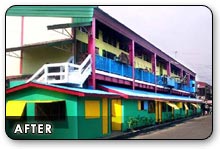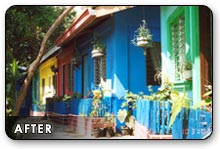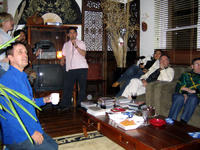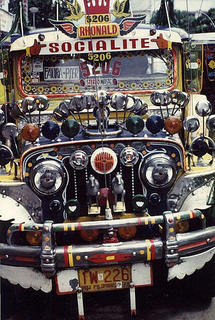 One of my close friends overseas has been daily circulating via email about Philippine news and he also includes his own opinion about these subjects.
The other day he wrote about an organization that is making an impact in alleviating poverty issues particulary in improving the lives of people in the slum areas of Manila. The movement's name is The Gawad Kalinga. Less for Self, More for Others, enough for all.
One of my close friends overseas has been daily circulating via email about Philippine news and he also includes his own opinion about these subjects.
The other day he wrote about an organization that is making an impact in alleviating poverty issues particulary in improving the lives of people in the slum areas of Manila. The movement's name is The Gawad Kalinga. Less for Self, More for Others, enough for all.
From shanties to colorful homes.
From sickness and malnutrition to health.
From streets to caring schoolrooms.
From slums to peaceful communities.
From poverty to self-reliance.
From a people in despair to a people with hope.
Honestly, I was moved. This is a subject that is like a big cancer in all the faces of the Filipinos because no matter where we go or who we become and what we achieve – we will always be looked down as people from a very poor third world country – and what foreigners will always remember is the smokey mountain images and dirty hungry children scavenging in mountains of garbage. We can choose to ignore it and even laugh about it. We even made films about it – showing how we hit rock bottom – and nothing more - should we not do something to help the sad plight of these people?
 In my opinion though, we are not the only poor country in the world and poverty is something that we cannot stop. Poverty is basically a personal battle and a state of mind - - something that will always be there.
What distinguishes the poor Filipinos especially in the urban slums from the other countries’ are the filthiness, the dirt, the destitute way of life, and the negative attitude. This is the negative picture of being poor.
Poor people in other countries (Japan, Thailand, Italy, France) are somehow dignified – as in they live in poor but clean conditions and live peaceful, contentedly striving and even beautiful and happy lives. They are poor but not destitute and miserable like our
In my opinion though, we are not the only poor country in the world and poverty is something that we cannot stop. Poverty is basically a personal battle and a state of mind - - something that will always be there.
What distinguishes the poor Filipinos especially in the urban slums from the other countries’ are the filthiness, the dirt, the destitute way of life, and the negative attitude. This is the negative picture of being poor.
Poor people in other countries (Japan, Thailand, Italy, France) are somehow dignified – as in they live in poor but clean conditions and live peaceful, contentedly striving and even beautiful and happy lives. They are poor but not destitute and miserable like our  own poor countrymen who wallow in being poor and become lazy drunkards, compulsive gamblers, irresponsible parents, immoral etc. The ugly sight and the yukky smell of being really poor!
The following are some of the things that people in slum areas should consider doing:
Go back to the provinces where they originally come from and make decent houses from natural resources like bamboo, wood, twigs, cogon grasses, nipa, coconut. These are cheap and free materials that would make decent and beautiful houses. Make a cre
own poor countrymen who wallow in being poor and become lazy drunkards, compulsive gamblers, irresponsible parents, immoral etc. The ugly sight and the yukky smell of being really poor!
The following are some of the things that people in slum areas should consider doing:
Go back to the provinces where they originally come from and make decent houses from natural resources like bamboo, wood, twigs, cogon grasses, nipa, coconut. These are cheap and free materials that would make decent and beautiful houses. Make a cre ative native nipa hut. Do not use garbage looking materials like tins, cardboards, used plywoods, etc that are found in the streets. Do not make houses from garbage materials. Make beautiful and neat houses. Plant a lot of flowers and vegetables around the house. Foreigners find these quite an attraction and we could be proud living in these houses.
In the provinces, life would be simpler and less expensive than in the city. It is here where you can feed your children from fruits and vegetables of the land. You do not need to find jobs in the barrio – as you become farmers and tillers of the land. Be self sufficient in the provinces. In the city, you have to buy everything including water etc. Life in the city is hard especially if you do not have education. And please please practice birth control.
Live a peaceful and contented life in the barrios and provinces. Avoid chasing dreams in the big city where most people only end up being failures (scavengers, prostitutes, drug addicts, thieves, criminals) . This is the reason why we have so many squatters and children in the streets of Manila and how we create
ative native nipa hut. Do not use garbage looking materials like tins, cardboards, used plywoods, etc that are found in the streets. Do not make houses from garbage materials. Make beautiful and neat houses. Plant a lot of flowers and vegetables around the house. Foreigners find these quite an attraction and we could be proud living in these houses.
In the provinces, life would be simpler and less expensive than in the city. It is here where you can feed your children from fruits and vegetables of the land. You do not need to find jobs in the barrio – as you become farmers and tillers of the land. Be self sufficient in the provinces. In the city, you have to buy everything including water etc. Life in the city is hard especially if you do not have education. And please please practice birth control.
Live a peaceful and contented life in the barrios and provinces. Avoid chasing dreams in the big city where most people only end up being failures (scavengers, prostitutes, drug addicts, thieves, criminals) . This is the reason why we have so many squatters and children in the streets of Manila and how we create d the famous poor people in the smokey mountains.
For those who opt to live in the slum or squatters area, then do a big clean up. Start by getting the walis tingting and clean the house and the surroundings and do this everyday. Throw away crap materials and garbage lying everywhere in the dwelling or vicinity. Clean the walls from pasted papers and posters. Clean the dirty sewerage system and the yukky waters everywhere. Find a nice place where you hang your washed clothes. Clean your children and teach them how to behave and do productive things. Plant flowers in pots. If your dwelling has been renovated by the organization, strive to maintain cleanliness as much as possible.
Remember there is a big difference between being poor and living like pigs and poor and living decently in humble but clean surroundings.
d the famous poor people in the smokey mountains.
For those who opt to live in the slum or squatters area, then do a big clean up. Start by getting the walis tingting and clean the house and the surroundings and do this everyday. Throw away crap materials and garbage lying everywhere in the dwelling or vicinity. Clean the walls from pasted papers and posters. Clean the dirty sewerage system and the yukky waters everywhere. Find a nice place where you hang your washed clothes. Clean your children and teach them how to behave and do productive things. Plant flowers in pots. If your dwelling has been renovated by the organization, strive to maintain cleanliness as much as possible.
Remember there is a big difference between being poor and living like pigs and poor and living decently in humble but clean surroundings.
In the end it is all about educating these people about discipline, cleanliness, responsibility. Doling out funds and money would not solve these problems.







































